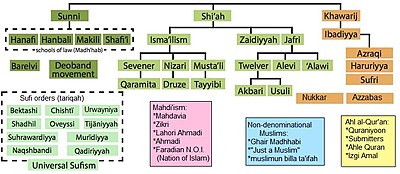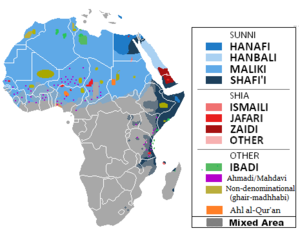The 2019 transitional constitution of Sudan guarantees freedom of religion and omits reference to sharia as a source of law, unlike the 2005 constitution of Sudan's deposed president Omar al-Bashir whose government had criminalized apostasy and blasphemy against Islam. Bashir's government had also targeted Shia Muslims and those engaging in proselytization to faiths other than Islam. Christians had also faced restrictions in matters of religious freedom.
Freedom of religion in Mauritania is limited by the Government. The constitution establishes the country as an Islamic republic and decrees that Islam is the religion of its citizens and the State.

Practitioners of Islam first entered Somalia in the northwestern city of Zeila during prophet Muhammad's lifetime whereupon they built the Masjid al-Qiblatayn; as such, Islam has been a part of Somali society since the 7th century.

Islam is the official religion of the United Arab Emirates. Of the total population, 76.9% are Muslims as of a 2010 estimate by the Pew Research Center. Although no official statistics are available for the breakdown between Sunni and Shia Muslims among noncitizen residents, media estimates suggest less than 20 percent of the noncitizen Muslim population are Shia.

Islam is the official state religion in Tunisia. According to the United States CIA, 99.1% of its adherents are Sunni Muslims. The constitution of Tunisia states that the country's “religion is Islam”, the government is the “guardian of religion”, and requires that the president be Muslim. The predominant madhhab in the country is the Maliki school. The Tunisian island of Djerba is home to a population of Ibadi Muslims.
Freedom of religion in Algeria is regulated by the Algerian Constitution, which declares Islam to be the state religion but also declares that "freedom of creed and opinion is inviolable" ; it prohibits discrimination, Article 29 states "All citizens are equal before the law. No discrimination shall prevail because of birth, race, sex, opinion or any other personal or social condition or circumstance". In practice, the government generally respects this, with some limited exceptions.
The Walashma dynasty was a medieval Muslim dynasty of the Horn of Africa founded in Ifat. Founded in the 13th century, it governed the Ifat and Adal Sultanates in what are present-day, Somalia, Djibouti, Eritrea and eastern Ethiopia.

The Dir is one of the largest and most prominent Somali clans in the Horn of Africa. They are also considered to be the oldest Somali stock to have inhabited the region. Its members inhabit Djibouti, Somalia, Ethiopia, and northeastern Kenya.

Islam in Africa is the continent's second most widely professed faith behind Christianity. Africa was the first continent into which Islam spread from the Middle East, during the early 7th century CE. Almost one-third of the world's Muslim population resides in Africa. Muslims crossed current Djibouti and Somaliland to seek refuge in present-day Eritrea and Ethiopia during the Hijrah ("Migration") to the Christian Kingdom of Aksum. Like the vast majority (90%) of Muslims in the world, most Muslims in Africa are also Sunni Muslims; the complexity of Islam in Africa is revealed in the various schools of thought, traditions, and voices in many African countries. Many African ethnicities, mostly in the northern half of the continent, consider Islam as their traditional religion. The practice of Islam on the continent is not static and is constantly being reshaped by prevalent social, economic, and political conditions. Generally Islam in Africa often adapted to African cultural contexts and belief systems forming Africa's own orthodoxies.
Freedom of religion in Comoros is addressed in the constitution which proclaims equality of rights and obligations for everyone.
The constitution of Brunei states that while the official religion is the Shafi'i school of Sunni Islam, all other religions may be practiced "in peace and harmony." Apostasy and blasphemy are legally punishable by corporal and capital punishment, including stoning to death, amputation of hands or feet, or caning. Only caning has been used since 1957.
The Constitution provides for the freedom to practice the rights of one's religion and faith in accordance with the customs that are observed in the kingdom, unless they violate public order or morality. The state religion is Islam. The Government prohibits conversion from Islam and proselytization of Muslims.
The Constitution of Kuwait provides for religious freedom. The constitution of Kuwait provides for absolute freedom of belief and for freedom of religious practice. The constitution stated that Islam is the state religion and that Sharia is a source of legislation. In general, citizens were open and tolerant of other religious groups. Regional events contributed to increased sectarian tensions between Sunnis and Shia.

Djibouti, officially the Republic of Djibouti, is a country in the Horn of Africa, bordered by Somalia to the south, Ethiopia to the southwest, Eritrea in the north, and the Red Sea and the Gulf of Aden to the east. The country has an area of 23,200 km2 (8,958 sq mi).
Islam is the majority and official religion in the United Arab Emirates, professed by 74.5% of the population as of 2020. 63.3% are Sunni, 6.7% are Shia, while 4.4% follow another branch of Islam. The Al Nahyan and Al Maktoum ruling families adhere to the Maliki school of jurisprudence. Many followers of the Hanbali school are found in Sharjah, Umm al-Quwain, Ras al-Khaimah and Ajman. Their followers include the Al Qasimi ruling family. The other main religions present in the country include Christianity (12.9%), Hinduism (6.2%), and Buddhism (3.2%). Zoroastrians, Druze, Baha'i, Judaism, and Sikhism are also practiced by some non-nationals. 1.3% of the population is agnostic.

The predominant religion in Somalia is Islam, with tiny minorities of Christians, traditional African religions and others.
The Harla, also known as Harala, Haralla are an ethnic group that once inhabited Ethiopia, Somalia, and Djibouti. They spoke the now-extinct Harla language, which belonged to either the Cushitic or Semitic branches of the Afroasiatic family.

Freedom of religion in Somalia refers to the extent to which people in Somalia are freely able to practice their religious beliefs, taking into account government policies, non-state actors, and societal attitudes toward religious groups. Due to the Somali Civil War, the enforcement of laws pertaining to religion by the various autonomous governments in the region is inconsistent.
The status of religious freedom in Africa varies from country to country. States can differ based on whether or not they guarantee equal treatment under law for followers of different religions, whether they establish a state religion, the extent to which religious organizations operating within the country are policed, and the extent to which religious law is used as a basis for the country's legal code.
The status of religious freedom in Asia varies from country to country. States can differ based on whether or not they guarantee equal treatment under law for followers of different religions, whether they establish a state religion, the extent to which religious organizations operating within the country are policed, and the extent to which religious law is used as a basis for the country's legal code.








